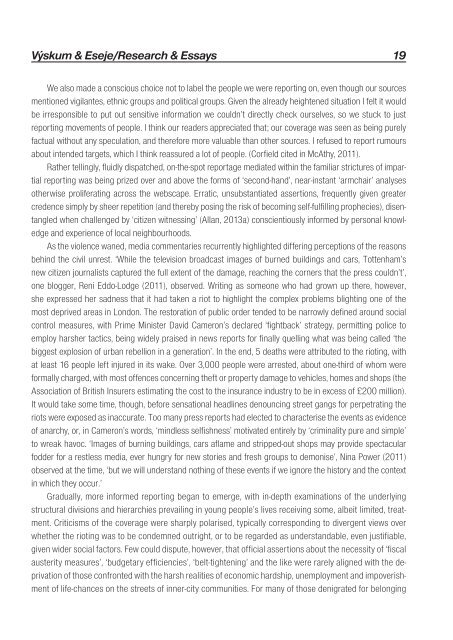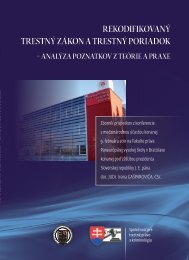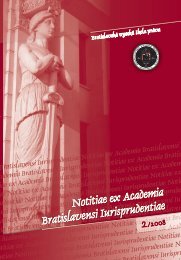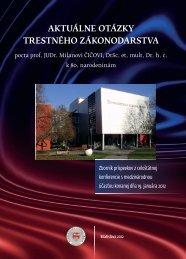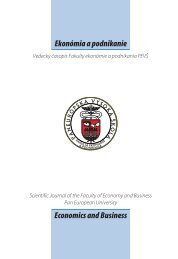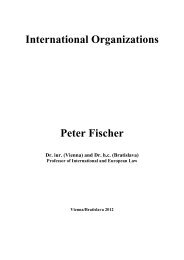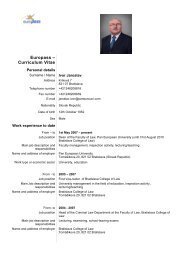ÄÃslo 1/2013 - Paneurópska vysoká Å¡kola
ÄÃslo 1/2013 - Paneurópska vysoká Å¡kola
ÄÃslo 1/2013 - Paneurópska vysoká Å¡kola
Create successful ePaper yourself
Turn your PDF publications into a flip-book with our unique Google optimized e-Paper software.
Výskum & Eseje/Research & Essays 19<br />
We also made a conscious choice not to label the people we were reporting on, even though our sources<br />
mentioned vigilantes, ethnic groups and political groups. Given the already heightened situation I felt it would<br />
be irresponsible to put out sensitive information we couldn’t directly check ourselves, so we stuck to just<br />
reporting movements of people. I think our readers appreciated that; our coverage was seen as being purely<br />
factual without any speculation, and therefore more valuable than other sources. I refused to report rumours<br />
about intended targets, which I think reassured a lot of people. (Corfield cited in McAthy, 2011).<br />
Rather tellingly, fluidly dispatched, on-the-spot reportage mediated within the familiar strictures of impartial<br />
reporting was being prized over and above the forms of ‘second-hand’, near-instant ‘armchair’ analyses<br />
otherwise proliferating across the webscape. Erratic, unsubstantiated assertions, frequently given greater<br />
credence simply by sheer repetition (and thereby posing the risk of becoming self-fulfilling prophecies), disentangled<br />
when challenged by ‘citizen witnessing’ (Allan, <strong>2013</strong>a) conscientiously informed by personal knowledge<br />
and experience of local neighbourhoods.<br />
As the violence waned, media commentaries recurrently highlighted differing perceptions of the reasons<br />
behind the civil unrest. ‘While the television broadcast images of burned buildings and cars, Tottenham’s<br />
new citizen journalists captured the full extent of the damage, reaching the corners that the press couldn’t’,<br />
one blogger, Reni Eddo-Lodge (2011), observed. Writing as someone who had grown up there, however,<br />
she expressed her sadness that it had taken a riot to highlight the complex problems blighting one of the<br />
most deprived areas in London. The restoration of public order tended to be narrowly defined around social<br />
control measures, with Prime Minister David Cameron’s declared ‘fightback’ strategy, permitting police to<br />
employ harsher tactics, being widely praised in news reports for finally quelling what was being called ‘the<br />
biggest explosion of urban rebellion in a generation’. In the end, 5 deaths were attributed to the rioting, with<br />
at least 16 people left injured in its wake. Over 3,000 people were arrested, about one-third of whom were<br />
formally charged, with most offences concerning theft or property damage to vehicles, homes and shops (the<br />
Association of British Insurers estimating the cost to the insurance industry to be in excess of £200 million).<br />
It would take some time, though, before sensational headlines denouncing street gangs for perpetrating the<br />
riots were exposed as inaccurate. Too many press reports had elected to characterise the events as evidence<br />
of anarchy, or, in Cameron’s words, ‘mindless selfishness’ motivated entirely by ‘criminality pure and simple’<br />
to wreak havoc. ‘Images of burning buildings, cars aflame and stripped-out shops may provide spectacular<br />
fodder for a restless media, ever hungry for new stories and fresh groups to demonise’, Nina Power (2011)<br />
observed at the time, ‘but we will understand nothing of these events if we ignore the history and the context<br />
in which they occur.’<br />
Gradually, more informed reporting began to emerge, with in-depth examinations of the underlying<br />
structural divisions and hierarchies prevailing in young people’s lives receiving some, albeit limited, treatment.<br />
Criticisms of the coverage were sharply polarised, typically corresponding to divergent views over<br />
whether the rioting was to be condemned outright, or to be regarded as understandable, even justifiable,<br />
given wider social factors. Few could dispute, however, that official assertions about the necessity of ‘fiscal<br />
austerity measures’, ‘budgetary efficiencies’, ‘belt-tightening’ and the like were rarely aligned with the deprivation<br />
of those confronted with the harsh realities of economic hardship, unemployment and impoverishment<br />
of life-chances on the streets of inner-city communities. For many of those denigrated for belonging<br />
GMJ Book.indb 19 21.1.<strong>2013</strong> 9:44


